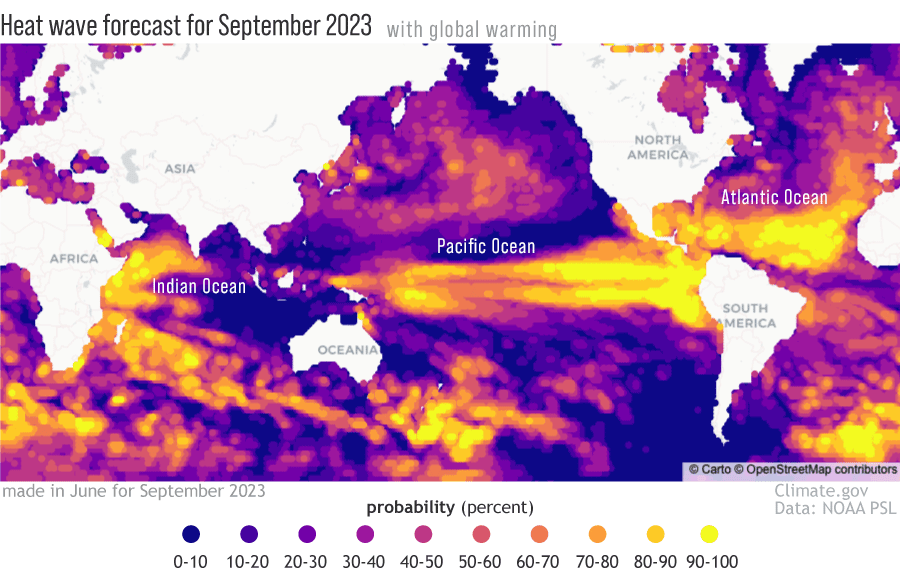Even Temporary Global Warming Above 2°C Will Have Impacts

The National Oceanic and Atmospheric Administration’s heatwave forecast for September 2023 illustrates how much worse marine heatwaves are due to global warming (NOAA Climate.gov https://www.climate.gov/faqs)
There is growing consensus that our planet is likely to pass the 1.5°C warming threshold. Research even suggests global warming will temporarily exceed the 2°C threshold, if atmospheric carbon dioxide (CO₂) peaks at levels beyond what was anticipated.
Exceeding our emissions targets is known as a climate overshoot. It may lead to changes that won’t be reversible in our lifetime.
These changes include sea-level rise, less functional ecosystems, higher risks of species extinction, and glacier and permafrost loss. We are already seeing many of these changes.
Our newly published research investigates the implications of a climate overshoot for the oceans. Across all climate overshoot experiments and all models, our analysis found associated changes in water temperatures and oxygen levels will decrease viable ocean habitats.
The decrease was observed for centuries. This means humanity will continue to feel its impacts long after atmospheric CO₂ levels have peaked and declined.
What Did The Study Look At?
Our analysis is based on simulations with Earth system models as part of the Coupled Model Intercomparison Project (CMIP6). The project underpins the latest assessment reports by the Intergovernmental Panel on Climate Change (IPCC).
We looked at multi-model results from two different CMIP6-developed experiments that simulate a climate overshoot.
One corresponds to a climate scenario simulating an overshoot this century.
The other experiment is from the Carbon Dioxide Model Intercomparison Project (CDRMIP). It was designed to explore the reversibility of a climate overshoot and how this impacts the Earth system.
We studied the combined effects of changes in ocean temperature and oxygen levels. These changes are linked because the warmer the water, the less dissolved oxygen it can hold.
In this study, we explored what warmer oceans and deoxygenation mean for the long-term viability of marine ecosystems. These changes have already begun under climate change.
To quantify these impacts we used a metabolic index, which describes the (aerobic) energy balance of individual organisms. In viable ecosystems, the supply of oxygen needs to exceed their demand. The closer supply is to demand, the more precarious ecosystems become, until demand exceeds supply and these ecosystems are no longer viable.
Under global warming in the ocean, we are already seeing an increase in metabolic demand and reduction in supply due to deoxygenation.
The index gives us the ability to assess how changing ocean temperatures impact the long-term viability of different marine species and their habitats. This allows us to explore how ecosystems across the world’s oceans respond to a climate overshoot, and for how long these changes will persist.
As conditions changed under the scenarios, we followed the evolution of the global ocean volume that can or cannot support the metabolic demands of 72 marine species.
What Did The Study Find?
Across all climate overshoot experiments and all models, our findings show the water volumes that can provide viable habitats will decrease. This decrease persisted on the scale of centuries – well after global average temperature recovers from the overshoot.
Our study findings raise concerns about shrinking habitats. For example, species like tuna live in well-oxygenated surface waters and are restricted by low oxygen in deeper waters. Their habitat will be compressed towards the surface for hundreds of years, according to our study.
Fisheries that rely on such species will need to understand how changes in their distribution will affect fishing grounds and productivity. What is clear is that ecosystems would need to adapt to these changes or risk collapsing with significant environmental, societal and economic implications.
What Are The Implications Of Shrinking Marine Habitats?
To date, most research has focused on ocean warming. The combination of temperature and deoxygenation we studied shows warming may harm marine ecosystems for hundreds of years after global mean temperatures have peaked. We will have to think more about resource management to avoid compromising species abundance and food security.
Climate overshoots not only matter in terms of their peak value but also in terms of how long temperature remains above the target. It is better to return from an overshoot than staying at the higher level, but a lot worse than not overshooting in the first place.
If we significantly overshoot the temperature targets of the Paris Agreement, many climate change impacts will be irreversible. Therefore, every effort should be made to drastically reduce emissions now. We can then avoid a significant climate overshoot, reach net-zero emissions by mid-century and keep warming “well below” 2°C.
Our assessment of potential future changes relies heavily on Earth system models. To better answer key questions about climate overshoots and the reversibility of the climate system, we need to further improve our models.
This includes sustained observations to validate our models. We must also develop new experimental frameworks to explore what can be done in the event of a climate overshoot to minimise its long-term impact.
(Published under Creative Commons from The Conversation. Read the original article here)





